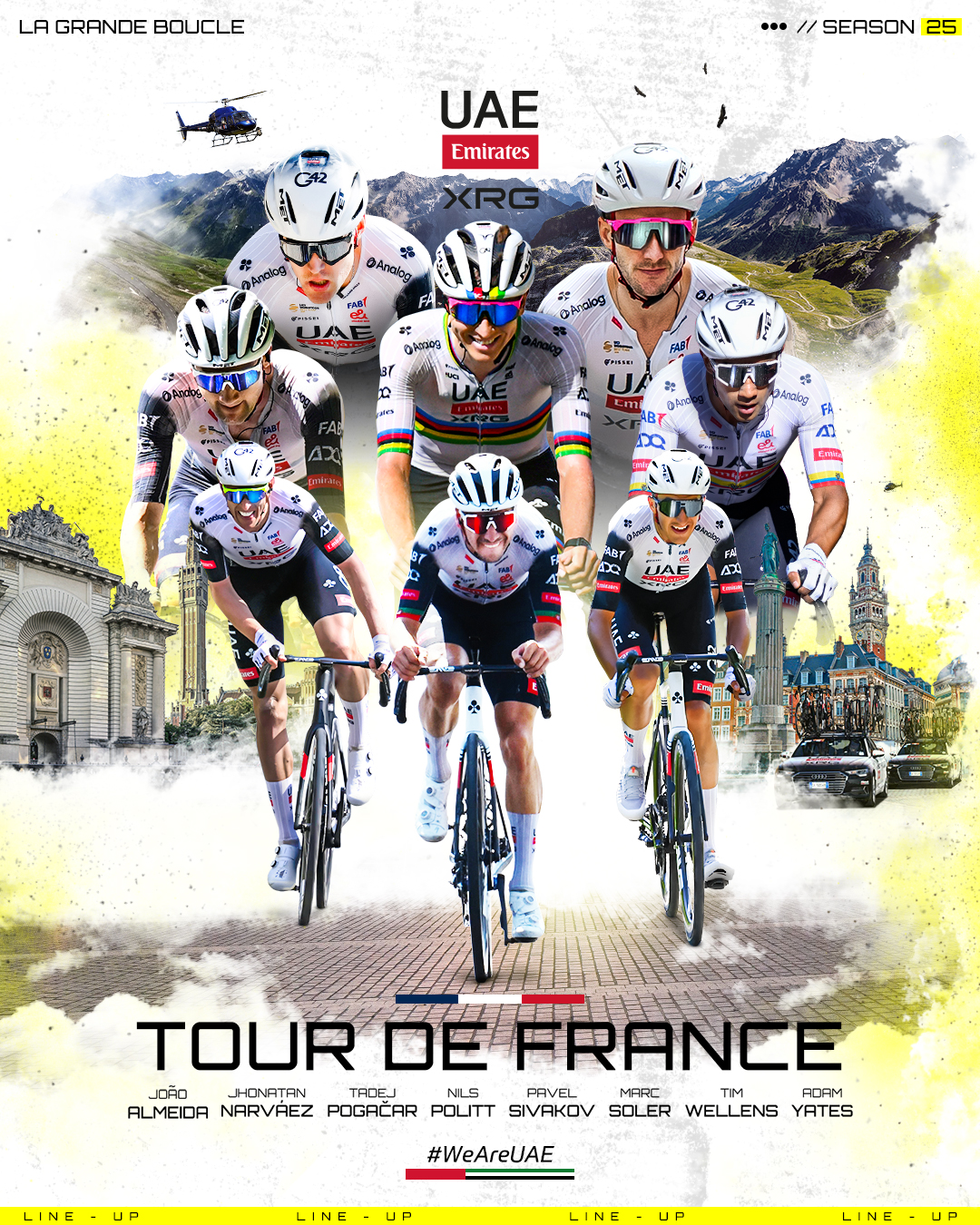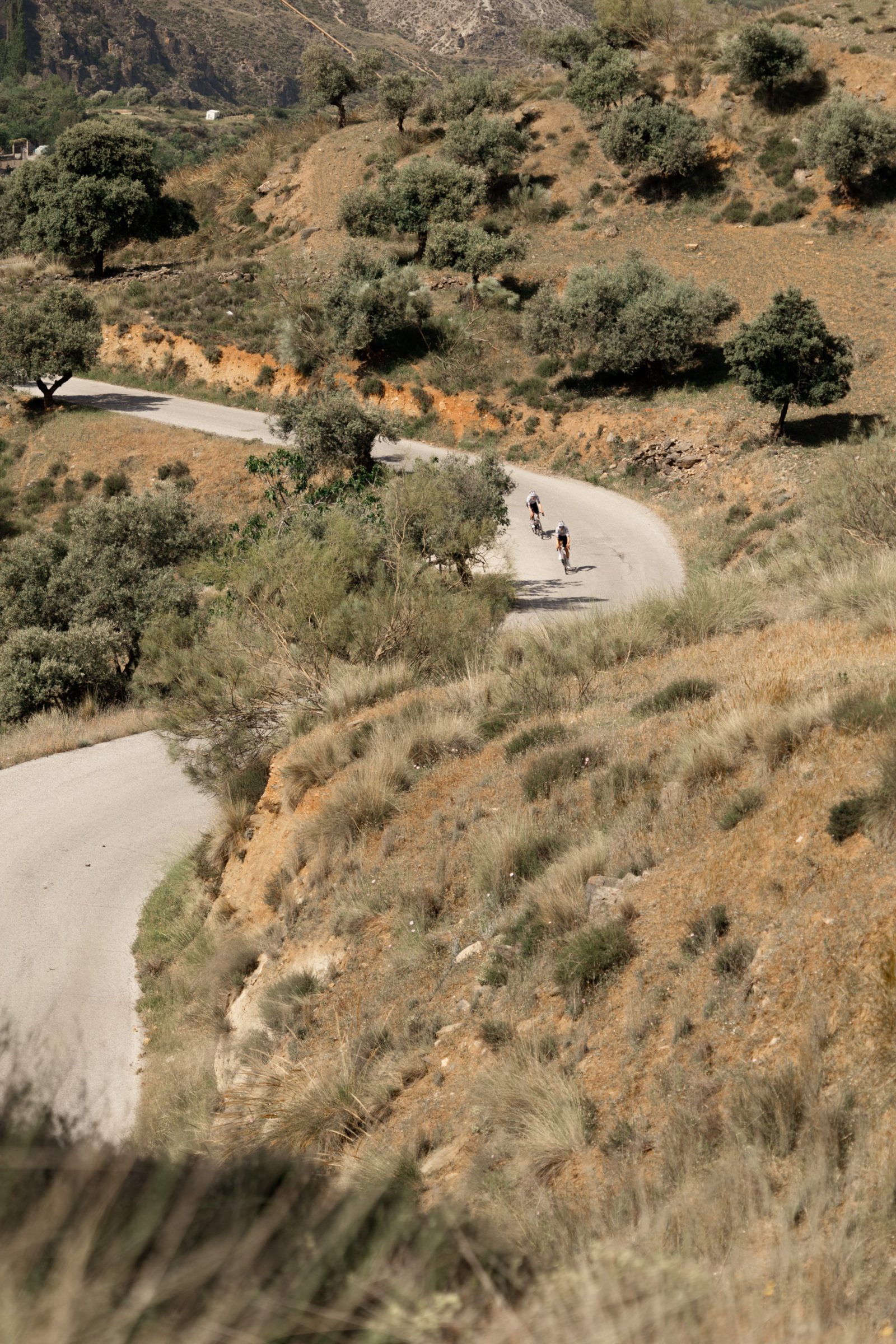News | Team | Tour de France • June 27, 2025
UAE Team Emirates-XRG and Tadej Pogačar aim for fourth Tour de France title
Pogačar set to be supported by five teammates from Critérium du Dauphiné success, with João Almeida and Adam Yates rounding out impressive squad
Heading to the Tour de France in search of a fourth title in six years, UAE Team Emirates-XRG can confirm the squad that will support Tadej Pogačar in July.
With a lineup that is strongly packed with both rouleurs and climbers, the eight-man Emirati squad will head into the Tour full of confidence after their recent Critérium du Dauphiné victory.
Five riders who supported Pogačar’s victory earlier this month will be alongside the Slovenian once again, with Marc Soler and Nils Politt two of the most experienced riders within the squad.
Elsewhere, Tim Wellens and Jhonatan Narváez will hope to replicate the impact they had on Pogačar’s stage 6 victory in the Dauphiné, with Pavel Sivakov more than earning his place with an instrumental role in the world champion’s victory on the following stage. Joining the Dauphiné winners at the start of the Tour de France will be two climbers who finished fourth and sixth at last year’s Tour, respectively.
João Almeida will be raring to go as one of the most in-form riders of the year, having become the first man since Bradley Wiggins (2012) to win three of cycling’s ‘big seven’ stage races in the same season. Coming off the back of victories in Itzulia Basque Country, the Tour de Romandie and the Tour de Suisse, the Portuguese rider takes career-best form into July, where he will look to support a Pogačar title push for the second year in succession.
Meanwhile, Adam Yates will return to the race in which he claimed a podium finish in 2023. The British climber memorably won the opening stage and claimed the race’s first yellow jersey that year, before going on to help Pogačar to a third title last summer.
On the hunt for a fourth Tour de France success this time around, Pogačar will be hoping to add to his 17 stage victories to date, having enjoyed an exceptional season that has thus far included victories at the Dauphiné, the Tour of Flanders and Strade Bianche.
With a strong team at his side, the Slovenian is looking forward to what will be his sixth successive Tour de France.
Pogačar: “I’m excited for the Tour to start. I’m lucky to have had close to the perfect preparation this year — everything has gone really smoothly, especially coming off a great altitude camp with my teammates. The vibes in the team are amazing right now, and that gives me a lot of confidence.
“Of course, you can never be fully prepared for something like the Tour de France — it’s unpredictable, and that’s part of what makes it so special.
“I’m expecting a very high level from all the other top riders. The first few days should be really exciting for the fans with some open, aggressive stages, and the last week is very climbing-heavy with some iconic stages. It’s going to be a big fight all the way to Paris, but I’m ready to give everything.
“It’s hard to believe it’s already my sixth Tour de France, time flies.”
Led by Sports Manager Joxean Matxin Fernández and Sports Directors Andrej Hauptman (Slo), Marco Marcato (Ita), and Simone Pedrazzini (SUI), the UAE Team Emirates-XRG lineup is as follows:
– João Almeida (Por)
– Jhonatan Narváez (Ecu)
– Tadej Pogačar (Slo)
– Nils Politt (Ger)
– Pavel Sivakov (Fra)
– Marc Soler (Spa)
– Tim Wellens (Bel)
– Adam Yates (GBR)
Wearing the world champion’s bands and the Ecuadorian national champion’s jerseys, respectively, both Tadej Pogačar and Jhonatan Narváez will stand out from the pack in France, but so too will their UAE Team Emirates-XRG teammates. Supplied by historic Italian brand Pissei, the Emirati squad will wear a special-edition kit at this year’s Tour.
As the team’s first special-edition kit for a Grand Tour, the Pissei design will certainly turn heads across the 21 stages, with all to be revealed later today.
Raced over 3,336.4km, this year’s Tour de France will be the first since 2020 to take place entirely within French territory. There is no shortage of climbing in this year’s route, with 53,538m of elevation gain spread out among the 21 stages, including six summit finishes.
Those six summit finishes will take place on the Puy de Sancy (stage 10), Hautacam (stage 12), Luchon-Superbagnères (stage 14), Mont Ventoux (stage 16), the Col de la Loze (stage 18) and La Plagne (stage 19). Standing at 2,304m, the Col de la Loze will mark the highest point of this year’s race.
Alongside the tests in the mountains, the riders will be subject to two individual time trials, the first being a flat 33km course in Caen, before stage 13’s 10.9km-long uphill TT on Peyragudes.
To allow for racing on Bastille Day, the first rest day of the race will not take place until after stage 9, falling on Monday, 14 July, before the second and final rest day on Monday, 21 July. As for the final day of racing, a traditional finish on the Champs-Élysées awaits on Sunday, 27 July, though the route will be anything but.
After its success in last year’s Olympic Road Race, the ASO have decided to include three laps of the local Côte de la Butte Montmartre circuit. Standing at 5.9% for 1.1km, the Montmartre climb is no small speed bump, and with its final ascent topping out with a little over 6km to ride, stage 21 of this year’s Tour de France might well have a decisive say on the race’s overall winner.
Before Paris, however, there are three distinctive weeks which will serve to sort out the contenders from the pretenders.
Beginning in Lille on Saturday, 5 July, the first week of this year’s race will guide the riders across the north of France through a series of nerve-jangling stages, all of which could leave their mark on the general classification. In the first nine days, there are, of course, five stages that might result in a bunch finish, but each of them bears the potential for crosswinds and echelons.
If the unpredictable weather across Normandy and Brittany doesn’t cause tension to rise within the bunch, then puncheur-friendly finales on stages 2, 4, 6 and 7 certainly will do.
Amongst their number lay a finish atop the Mûr‑de‑Bretagne on stage 7, the site of Dan Martin’s memorable stage victory for UAE Team Emirates-XRG in 2018.
Looking past the first rest day, the second week of racing will see the peloton head south with a summit finish at Puy de Sancy, before transitioning into the mountains of the Pyrenees. Here, they will be faced with two fearsome summit finishes at Hautacam and Luchon-Superbagnères, along with a short but steep time trial at Peyragudes.
Between Muret to Carcassonne, the stage to Luchon-Superbagnères will be followed up by a hilly day out on stage 15 before the final rest day.
As if a third-week showdown in the Alps was not enough, the final week of racing will begin with the stage to Mont Ventoux, a legendary peak which has come to define many editions of the Tour de France in days gone by. It is a mountain that last featured in the Tour in 2021, with Pogačar on his way to a second successive title. The Emirati squad will hope this proves a good omen as the peloton climbs the ‘Giant of Provence.’
Stage 18 will be designated as the race’s Queen stage, finishing atop of the mighty Col de la Loze, with stage 19 giving no room for a breather on the following day. La Plagne will host the final summit finish of this year’s race, but stage 20 is no easy task. Taking placr across the Jura, there are enough hills on the penultimate day to cause an upset should the general classification remain tight.
All in all, including the addition of the Côte de la Butte Montmartre on stage 21, this year’s Tour de France looks incredibly climber-friendly. With that being said, the first week of racing will see the rouleurs and puncheurs prove essential to help navigate their team leaders through tricky terrain and unpredictable weather conditions.













